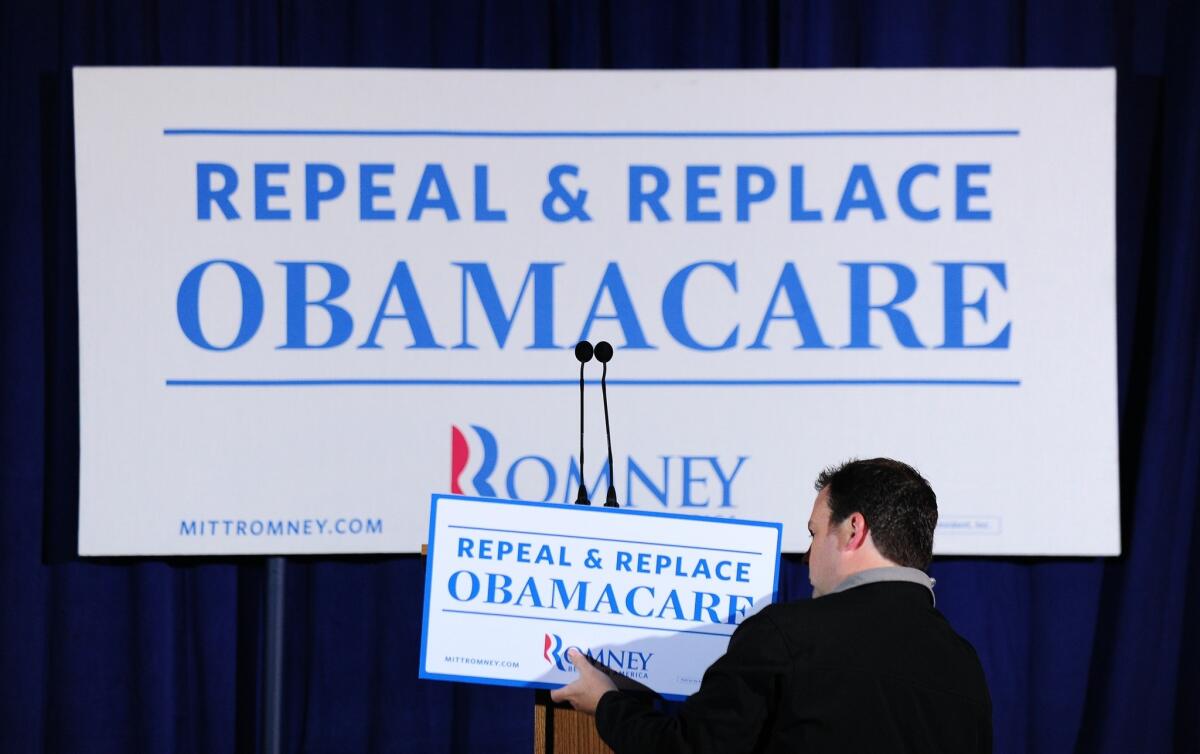Opinion: The dueling Obamacare memes: Which one should you believe?

In the wake of Tuesday’s conflicting appeals-court rulings on Obamacare subsidies, critics of the law have advanced at least two memes for those whose memories don’t extend far enough for them to recall the actual debate in Congress in 2009 and 2010. One of them is almost purely fictional. The other, though, is pretty firmly rooted in events.
The memes attempt to explain why the Affordable Care Act, which tries to expand access to health insurance and slow the growth of costs, would include a provision that could undermine both goals. The provision says that a family’s premium tax credits -- that is, insurance subsidies -- are to be based in part on what the family pays for a health plan obtained “through an exchange established by the state.” When the Internal Revenue Service decided that subsidies would also be available to those enrolled through the exchanges set up by the federal government, various groups of individuals and businesses filed four lawsuits challenging the decision. A three-judge panel at the U.S. Circuit Court of Appeals for the District of Columbia ruled Tuesday that the IRS had exceeded its authority and misinterpreted the law, while another panel at the 4th Circuit ruled that the agency hadn’t.
The made-up narrative is that Congress deliberately denied premium tax credits to states that didn’t set up their own insurance-buying exchanges so that states would be motivated to do so. Under this view, the IRS unilaterally reversed that policy after an unexpectedly large number of states (36 at the moment) decided not to operate their own exchanges.
As I pointed out in a post Tuesday, there’s no evidence to back up this story line. Although the idea was floated in a draft version of the Affordable Care Act written by the Senate Health, Education, Labor and Pensions Committee, the House and the Senate Finance Committee went in a sharply different direction.
There is, however, plenty of circumstantial evidence that Congress did not intend to withhold premium tax credits from states with federally run exchanges, as well as indicators within the law itself that the subsidies were to be available nationwide. Here’s one telling bit: In evaluating the versions of the bill being voted on in the House and Senate, the Congressional Budget Office -- Congress’ definitive financial scorekeeper -- never once suggested that subsidy costs would depend on the number of states setting up their own exchanges. If that had been a real possibility for reducing the cost of the bill, Democrats (who were eager to minimize the measure’s cost) would certainly have pushed the CBO to tote up the potential savings.
A more likely explanation for the disputed provision is that authors wanted to distinguish governmental exchanges from the private ones that were emerging in the insurance market. But they drafted it poorly, not recognizing how the wording might affect subsidies in states that didn’t establish exchanges. Contributing to the problem was the fact that Democrats didn’t expect so many Republican-led states to cede that job to the federal government, given the amount of GOP support for the concept of insurance exchanges.
(Illustrating this point, the GOP’s vice presidential nominee in 2012, Rep. Paul Ryan of Wisconsin, incorporated exchanges in his proposal for overhauling Medicare.)
The second narrative is that the controversy and confusion over the provision are a direct result of Democrats ramming through a bill that no one understood and many had not even read. This meme picks up on the oft-cited line by then-House Speaker Nancy Pelosi (D-San Francisco) in 2010 that senators “have to pass the bill for you to find out what is in it, away from the fog of the controversy.” (She was referring to the political and rhetorical dust storms kicked up by the Senate’s unseemly scramble to line up 60 votes, which produced such legislative lowlights as the (short-lived) “Cornhusker Kickback” and the “Louisiana Purchase.”)
It’s inarguable that the process Democrats used to enact Obamacare was ugly. They passed the Affordable Care Act and the companion Health Care and Education Reconciliation Act without a smidgen of Republican support. Some provisions were inserted without public hearings and with little debate, and key versions of the bills were cobbled together behind closed doors.
As a consequence, the legislation was vetted only by Democrats, which all but guarantees that it will say and do some things they didn’t intend. Worse, only Democrats are now invested in its success. So they have no way to fix problems in the law short of repealing the provisions involved, which is the only solution Republicans seem interested in. And when a court ruling blows a huge hole in the act, as the D.C. Circuit’s decision threatens to do, Republicans find themselves with veto power over any legislative attempt to plug it.
Proponents of healthcare reform say Democrats can’t be blamed entirely for this. Key members tried to strike compromises with Republicans, especially in the Senate, but they were ultimately rebuffed by a GOP unwilling to help President Obama achieve a legacy-defining legislative victory.
That oversimplifies what was happening in 2009. Although plenty of Republicans fell into the over-my-dead-body camp, there were others who agreed that healthcare spending was rising too fast and too many Americans were uninsured. They favored a more cautious approach than Democrats did, one that made greater use of market forces and deregulation to rein in healthcare costs and provide more affordable insurance options. But Democrats were more interested in a comprehensive bill than a bipartisan one.
Many healthcare reformers favored the Democrats’ approach over the incrementalism advocated by Republicans. In their view, the only hope of solving the systemic problems in the healthcare system is for someone like Obama to push through an ambitious but politically risky overhaul by whatever means necessary. But even if they’re right about the merits of a big, bold measure such as the Affordable Care Act, the experience since 2010 argues against taking such leaps without at least some support on both sides of the aisle.
Otherwise, lawmakers find themselves in the position Democrats are in today, having only administrative Band-Aids to patch up the problems that emerge as Obamacare is implemented. Some of the patches have proved so controversial, they’ve created problems of their own. Advocates are left to hope that the Band-Aids hold long enough for the measure’s benefits to become more apparent. Those include the search for effective ways to rein in healthcare costs and the ramped-up emphasis on preventive care. But the D.C. Circuit pulled off one of the bandages Tuesday, and if its ruling holds up on appeal, the entire act could fall to pieces.
Follow Healey’s intermittent Twitter feed: @jcahealey
More to Read
Start your day right
Sign up for Essential California for news, features and recommendations from the L.A. Times and beyond in your inbox six days a week.
You may occasionally receive promotional content from the Los Angeles Times.







